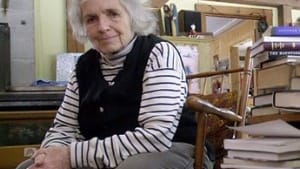Stay in the Loop
BSR publishes on a weekly schedule, with an email newsletter every Wednesday and Thursday morning. There’s no paywall, and subscribing is always free.
Dishing it with Grace Paley

I washed dishes with Grace Paley.
Grace Paley, that is, the short story writer, poet, and activist who died in 2007. We were at a writers’ workshop in a small river town in Oregon: Paley was teaching a class on short fiction, and I was right-hand woman to the workshop’s director. My tasks included making coffee for 85 women each morning, banking a fire in the huge hearth of the lodge, and managing participants’ anxieties, which took various forms but all stemmed from the same root — the terror of facing the blank page.
They came to me for an adaptor plug or an extra pillow, to ask if the salad dressing contained mayonnaise (nope, not the vinaigrette) or the brownies were made with sugar (well, yeah). Once, there was a late-night shriek in Building B: A woman had gone to the bathroom and found a packrat in the shower. Later, we discovered its attic nest, full of summers’ worth of stolen bling — shiny barrettes, silver bracelets, a couple of bright dimes.
Each day, participants ate ravenously from the breakfast buffet of cornmeal pancakes and homemade yogurt, then trooped off to their classes in writing poetry and memoir, crafting short stories or starting novels. In the evenings, there were readings in the lodge, the McKenzie River providing white noise as it swooshed past the deck.
Away from home and the responsibilities of kids, partners, and jobs, most women managed to push past their nerves to write with candor and verve. Even now, years later, I remember fragments of what they read: a velvety short story about a man named “Sweet T” who died too young; a harrowing account of rape and recovery; a sonnet jumpy with modern cadences.
Comfort and connection
Paley was living in Vermont then — she’d finally left her native New York — and hadn’t packed for an Oregon June, which can be cool and misty in the mornings, hot enough for shorts by midday. She was cold in her cabin, so we set up a share-box in the lodge for women to donate extra clothing to her cause. She showed up the next morning wearing two skirts, a couple of mismatched sweaters, a scarf and leg warmers, her frizzled gray hair poking from underneath someone’s fleece hat.
She didn’t care. Paley was supremely unself-conscious. I doubt she even owned a mirror. She certainly hadn’t brought one with her to the workshop. And she was sincerely grateful for every piece of her motley, borrowed getup. The point was not to be gorgeous; it was to be comfortable, to be connected, to help each other through.
That included KP duty, even if you were the oldest instructor on board and a pair of energetic teenagers was being paid to do the dishes. Paley, who once described herself as “a somewhat combative pacifist and cooperative anarchist,” poked her head into the kitchen one night as we were scrubbing giant colanders and bagging up the trash. We tried to usher her out — “No, no, Grace, you don’t have to help” — but she reached for a dishtowel and stood implacably by the sink. What could we do but pass her a dripping ladle?
I don’t remember what we talked about as we stood there, a handful of women across five decades of life, washing and rinsing and drying and stretching to hang the clean pots on iron hooks over the butcher-block counter. I imagine we mined the subjects of a Paley story: daughterhood, motherhood, friendship, love fulfilled and betrayed, the inextricable twinning of happiness and grief.
In her stories, Paley deftly captured the lives of New Yorkers (mostly Jewish, mostly women) through spot-on dialogue and narrative that was both spare and rich. In her life, she protested the Vietnam War (and was jailed several times), lobbied for women’s rights, and spoke out against nuclear proliferation.
All of a piece
For her, there was no chasm between art and life, between being and doing: raising her daughter and son, writing poems about the “disappeared” children of El Salvador, teaching young writers at Sarah Lawrence to tell a story in the most honest words they could find — all of it was of a piece. Paley understood that human beings were deeply, viscerally connected and that survival — of ourselves, our children, and the planet — depended on recognizing that fact and then acting on it.
She came in to wash the dishes because there were dishes to be washed; for her, a mess (in the kitchen, in a country) was never just someone else’s responsibility. And maybe because the clang of silverware, the clamor of conversation, the laughter punctuated by running water, the lozenge of warm light, called to her through that swinging door.
Later that week, when it was Paley’s turn to read her work in the evening program, the workshop director introduced her with a story: Paley had been interviewed on the radio by someone who was gushing over her accomplishments: “Oh, Ms. Paley, you’ve been an activist and a short story writer; you’ve been to Vietnam and El Salvador; you’ve raised children and organized neighborhoods and planted a garden. How do you find the time?”
Paley paused. “Well, I’ve got all day, don’t I?”
I think of that story, and that summer, when I feel besieged or hopeless, when the news is grim and the cat is sick and I am facing a sink full of dishes after a rollicking dinner. I think of Grace. I reach for a sponge. I get to work.
Sign up for our newsletter
All of the week's new articles, all in one place. Sign up for the free weekly BSR newsletters, and don't miss a conversation.

 Anndee Hochman
Anndee Hochman